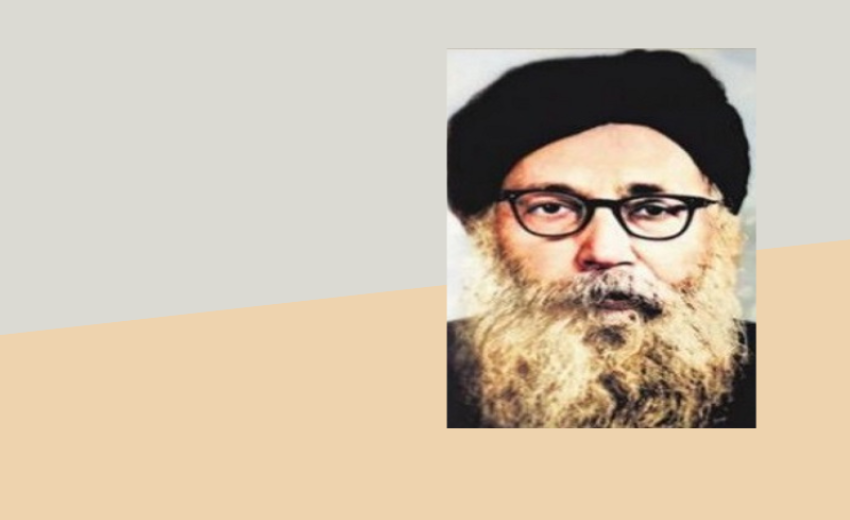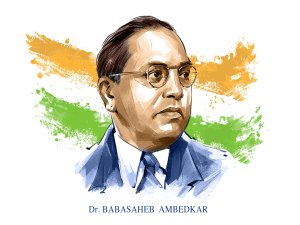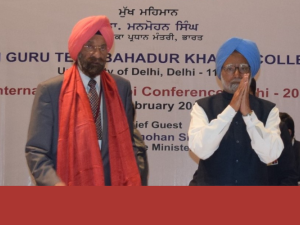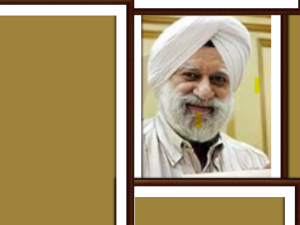It will seem amazing to the present generation that at the most crucial period of Punjab history from the 1940’s to the1960’s there was one Sikh leader, Giani Kartar Singh who was recognized by all stock holders as the "brain of the Sikhs". He was the President of Shiromani Akali Dal at the time of the partition of India and played an historic role in not only getting Punjab partitioned but also taking the bold decision of the Sikhs going with India.
Giani Kartar Singh was arguably one of the most articulate, sharp and prudent leaders that the Sikh community has ever produced. He was at the helm of affairs along with Master Tara Singh and Baldev Singh during the most crucial phase of the Partition of India. It is without doubt that he always thought for the Sikhs, worked for the Sikhs and lived for the Sikhs.
Born in 1902 at Chak No. 40 in Lyallpur district, Giani Kartar Singh after matriculation, joined Khalsa College, Amritsar, in 1920 for his higher education but could not complete his graduation and left his studies midway to plunge himself into politics. He was an eyewitness to the Jallianwala Bagh tragedy in 1919 and that event made him a staunch nationalist to fight against British imperialism. At Khalsa College he came into contact with stalwarts like Bawa Harkrishan Singh, Prof. Niranjan Singh and Prof. Teja Singh. Gianiji took part in almost all agitations during the Sikh Gurdwara reforms movement, and went to jail several times. He was elected a member of the SGPC when it first came into being in 1924 and remained its member continuously.
He was elected MLA in the first ever Assembly elections in Punjab in 1937. It is interesting to note that to make him eligible to be a voter one Sikh landlord donated land to him. He made his name as a potential political leader and organizer and very soon was part of the Akali Party High Command. When negotiations for the Independence of the India were initiated by the British government they treated Sikhs as the third party and in all meetings the Akali delegations were invited in addition to those of the Congress and the Muslim League. Giani Kartar Singh, who was a leading negotiator, realized at that time that the British Government had formally accepted the demand for Pakistan and in that eventuality Sikhs would be the worst sufferer. To forestall the creation of Pakistan and Partition of India, the leadership came forward with a proposal for Azad Punjab. The imaginative idea of Giani Kartar Singh was accepted by all and many conferences were organised all over Punjab for its support. At that time Giani Kartar Singh convinced the Hindu leadership of Punjab to make a united front. As per the formula worked out for the Partition of India, the Muslim majority provinces were to form part of Pakistan. The Akali leadership, of which Giani Kartar Singh was the main pivot, convinced the British authorities, that the Partition of Punjab was a necessity. He had many meetings with Muslim leaders and also with Mohd Ali Jinha. The Sikh leaders totally refused to accept any allurement by the Muslim League. It was a well known fact that the British government officers made all efforts to bring a rapprochement between by the Muslim League and the Aklai Party.
Giani Kartar Singh was a selfless man and was known among his admirers as a “fakir”. In 1946 when S. Baldev Singh, who was a minister in the Punjab Cabinet, joined as India’s first Defence Minister in the interim government, a vacancy was to be filled by another Akali legislator. The party selected Giani Kartar Singh as the leader unanimously but he thankfully refused to become a minister and offered the post to Swaran Singh. In his whole life time Giani Kartar Singh did not buy any property and had never kept any bank account. Whatever money he received as salary or allowances, or collected from his friends was spent by him on party work. It is said that in Giani Kartar Singh there was total absence of vanity. People had seen him standing and eating on the road side, and having meals at dhabas. He was known for his frank and warm-hearted personality. I was in Govt. service when he was Minister agriculture and cooperative. He used to travel extensively and encourage Akali workers. I am aware that many Sikh officers who were earlier trimming beards became Pukka Sikhs. Giani Kartar Singh at the risk of his life remained in Pakistan to evacuate the Sikhs from Lyallpur and Shekupura and led a miles long carvan of the farmers to India.
After Partition Dr. Gopi Chand Bhargwa, the first Chief Minister of Punjab, invited Gianiji to join his Cabinet. Later on, he also was a member of the team headed next CM Bhim Sen Sachar. It was during that time that his efforts resulted in what is called the Sachar Kartar Singh formula in which the demarcation of Hindi and Punjabi regions of the Punjab was made. This paved the way for the demand of Punjabi Suba which was ultimately achieved by the Akalis in November, 1966. He was also a Minister in Partap Singh Kairon Cabinet in 1957. Giani Kartar Singh remained on the forefront of political life in Punjab and at times changed political parties. But it is said that he did this only to gain maximum benefits for the community.
During his illness he was admitted to the Government hospital at Patiala where he died on June 10, 1974 and was cremated at Tanda which he had adopted as his Assembly constituency. I was present at his bhog ceremony at Tanda where Giani Zail Singh, the then Chief Minister of Punjab, named Government College, Tanda, as Giani Kartar Singh College to cherish his memory.
Unfortunately his life and works have so far remained largely ignored. Men like him have since ceased to be role models for present day politicians.
SikhNet is honored that Sardar Tarlochan Singh ji, EX-MP, Former Chairman National Commission Minorities, India is sharing his personal recollection of historical events with our audience.
The opinions expressed here are personal to the author and do not necessarily reflect an editorial position of the SikhNet staff or board.





